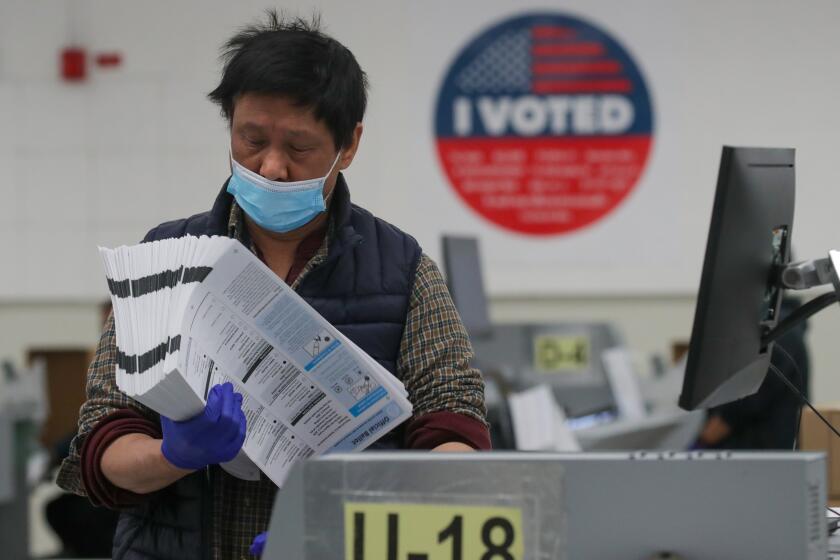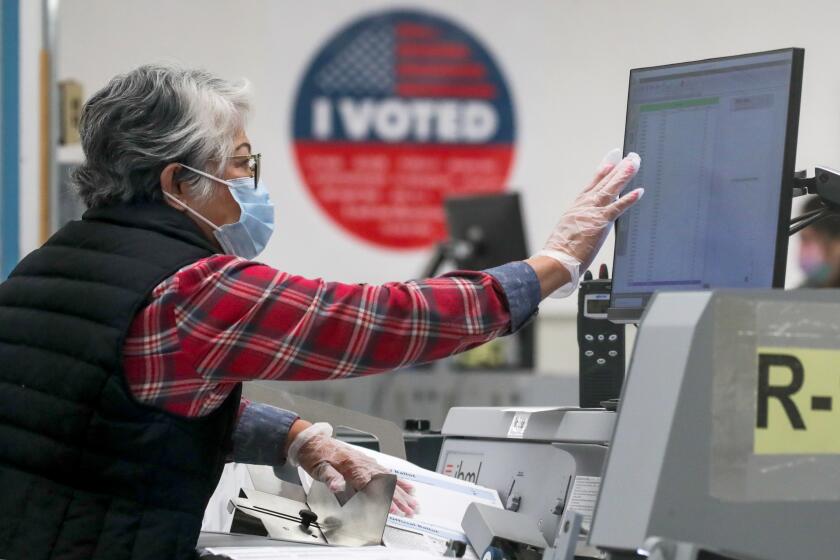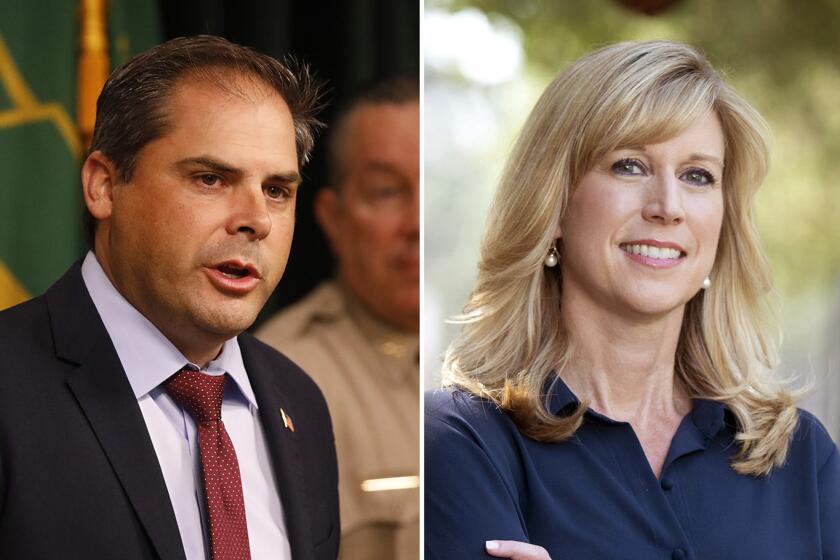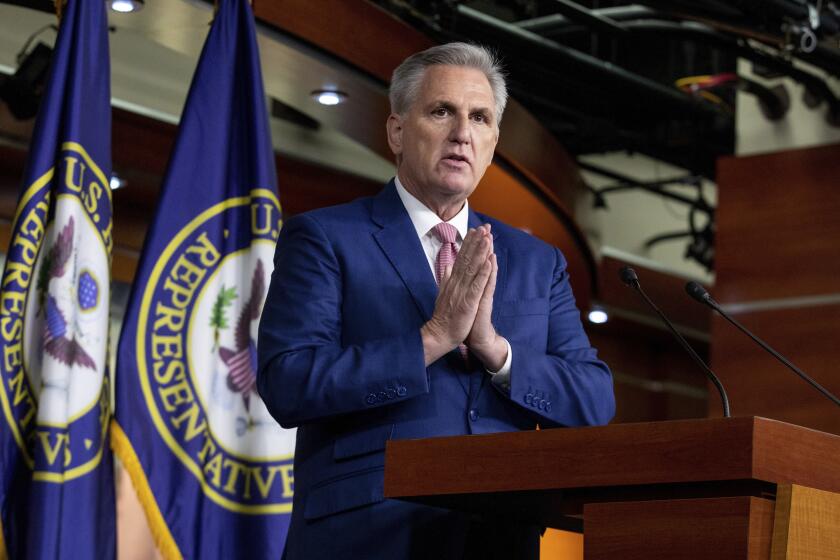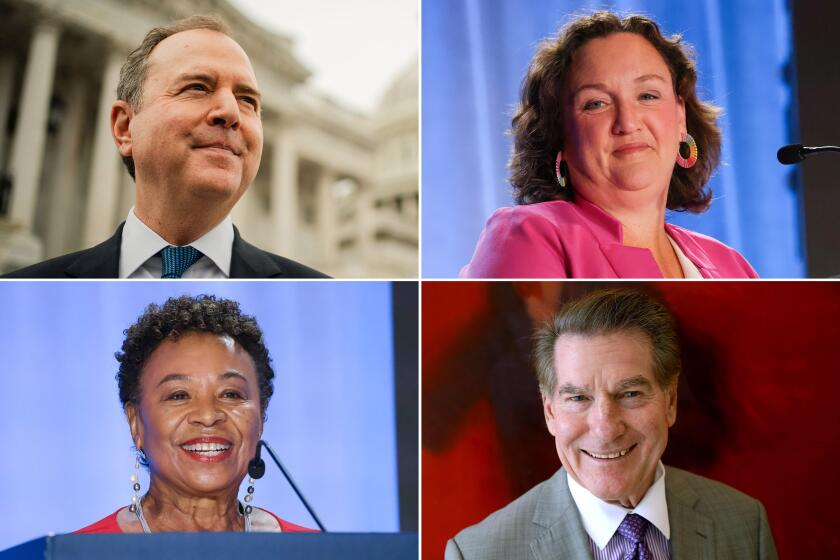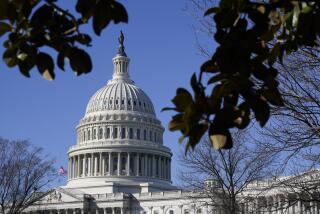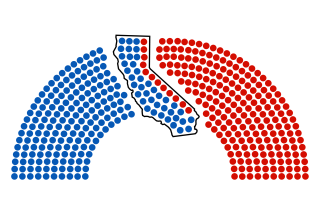Could California decide control of Congress? A Democratic super PAC plans to spend $35 million in the state
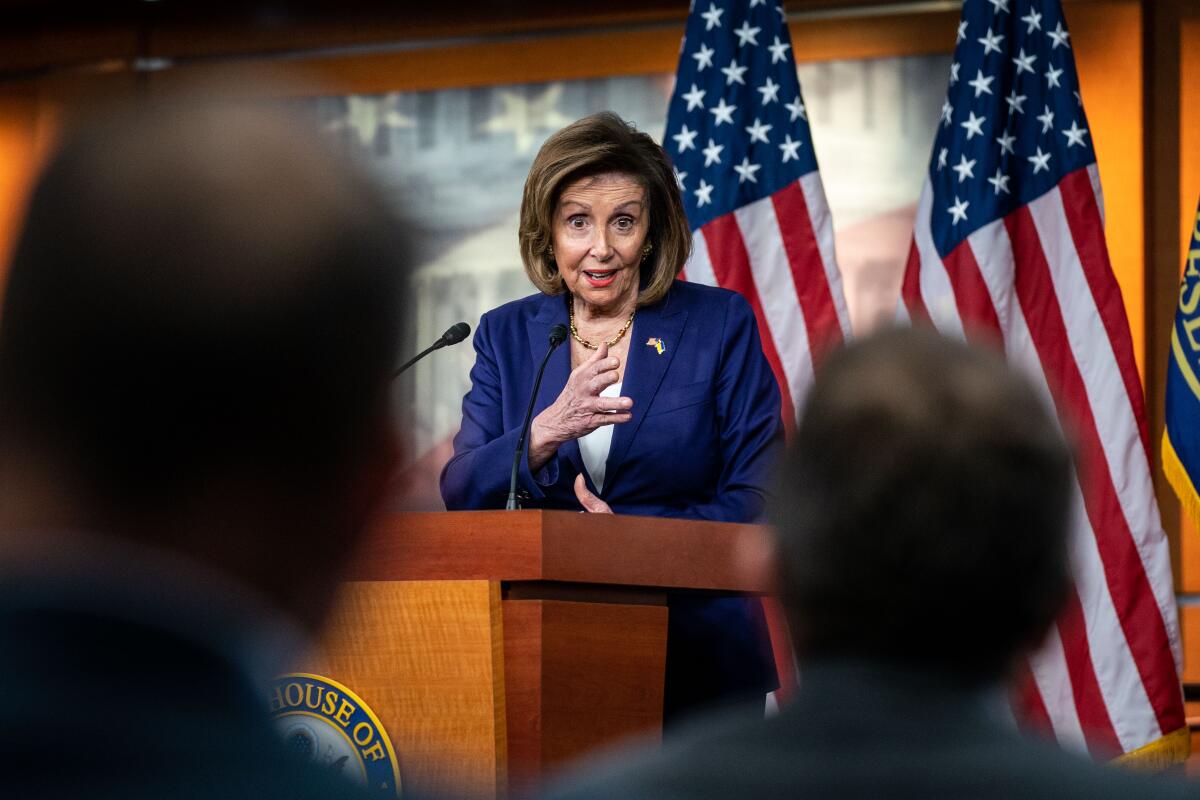
Democrats consider California pivotal to the party’s efforts to regain control of the U.S. House of Representatives in 2024, with a super PAC tied to former House Speaker Nancy Pelosi pledging Tuesday to spend $35 million on competitive congressional races in the state.
That’s roughly triple what the group spent in the 2022 midterm campaigns in the Golden State, when Democrats underperformed in heavily blue strongholds such as California while fending off an expected Republican red wave in congressional races across the nation.
“Democrats can’t retake the House without winning seats back in California,” said David Wasserman, a congressional forecaster for the nonpartisan Cook Political Report.
Wasserman said Democrats’ strategic decisions have historically teetered between the need to win House seats in states such as California and the cost of campaigning in areas with such expensive media markets. In the November election, the party suffered the consequences for not spending big in California races and losing some close contests.
“Democrats abandoned … multiple California districts that ended up being fairly close, and they spent a lot of money in other districts that didn’t end up being very close,” he said.
The party and affiliated committees have “long been hesitant about laying down big bucks on California races because the markets are so expensive. They feel like there’s a better return on investment” elsewhere, Wasserman added.
In the midterm election, California swayed control of Congress and the last races added to Republicans’ margin of power. Here’s where House races stand.
Despite Democrats’ overwhelming voter registration advantage in California, it is home to several competitive congressional districts, in large part because they are drawn by an independent commission that pays no heed to protecting officeholders. The Republicans’ main congressional super PAC invested heavily in the state to protect the party’s incumbents, won an open seat in the Central Valley and nearly knocked out a prominent Democratic House member.
Although the GOP took control of Congress in 2022 and Bakersfield Rep. Kevin McCarthy won the House speaker’s gavel in January, the margin of both victories was far narrower than expected, given historical trends, economic malaise and President Biden’s lackluster approval ratings.
Democrats saw California as a rare opportunity for offense in the 2022 congressional midterms. Republicans hoped to capture blue territory. Neither parties’ wildest dreams came to pass.
Mike Smith, the president of the House Majority PAC, which is aligned with Democratic leaders in Congress, said the committee plans to focus on 18 congressional districts across the nation that are represented by Republicans but voted for Biden in 2020. Five are in California — the exact number of seats Democrats need to flip to reclaim control of the House.
“California is critical to the path,” said Smith, a former senior Pelosi advisor. “We want to lay a marker down early.”
Under federal election law, the House Majority PAC is allowed to raised unlimited sums from donors for independent expenditures on individual races, while the national parties and candidates themselves face contribution limits.
In 2022, Republican incumbents held on to seats in the Central Valley, northern Los Angeles County and Orange County that Democrats were confident about winning because of Biden’s success in these districts.
The reelections of GOP Reps. David Valadao of Hanford and Mike Garcia of Santa Clarita are prime examples, and were the result of finding candidates who fit their districts politically as well as smart and effective campaign spending, said Republican redistricting expert Matt Rexroad.
“It’s not going to be a layup” for Democrats, Rexroad said. “McCarthy has done a good job of recruiting candidates who can hold their districts for not just one term, but for an extended time period.”
Paul Mitchell, a Democratic redistricting expert, agreed that his party “totally walked away” from the Garcia race, which he believed was one of his party’s best opportunities in the nation.
But he also argues Democrats will have a better chance in a number of California congressional districts because 2024 is a presidential election year, which means greater turnout among young people, minorities and other voters who tend to favor Democratic candidates.
“We are going to have much, much higher Democratic turnout,” Mitchell said.
The Democratic political action committee’s pledge to spend a significant amount of money supporting the party’s candidates comes months after former state Assemblywoman Christy Smith, who unsuccessfully ran against Garcia three times, called out national Democrats for not backing her campaign in 2022.
“The utter lack of investment made no sense,” Smith said in an interview late last year, shortly after she castigated her party on Twitter for failing to support her sufficiently in the race to represent California’s 27th District, which includes Santa Clarita, the Antelope Valley and parts of the San Fernando Valley.
The onetime GOP stronghold has grown more Democratic as Los Angeles residents moved there seeking affordable housing. The decennial redrawing of congressional maps made the district even bluer by excising Simi Valley.
“Our campaign got next to zero outside resources to fight this battle,” Smith said in her remarks on Twitter. With no help on the airwaves and little elsewhere from liberal committees and PACs, “we didn’t stand a chance,” she said.
As Republican Rep. Mike Garcia nears reelection in a Democratic L.A. County district, second-guessing begins. Democrat Christy Smith says she got ‘next to zero’ help.
The parties’ political action committees’ 2022 spending in California was incredibly lopsided, with the House Majority PAC spending less than $12 million compared with the $33.1 million spent by its Republican counterpart, the Congressional Leadership Fund linked to McCarthy.
The Republican super PAC is expected to spend a similar amount in California this cycle to aggressively defend its incumbents in tight races and to try to oust vulnerable Democrats.
“We won for two cycles in a row in California because of great Republican candidates and voters being fed up living in a state where Democrat governance has led to high crime and high costs. California will remain key in the fight to protect the House majority,” said Dan Conston, president of the Congressional Leadership Fund.
McCarthy has long been a fundraising powerhouse, and his prowess appears to have grown since he became speaker. In February, at his first fundraiser after being elected the leader of the House, he reportedly brought in more than $12 million in one night.
California Gov. Gavin Newsom reports having nearly $25 million in the bank.
The Congressional Leadership Fund spent $2.5 million in the Garcia-Smith contest, while the House Majority PAC spent a little more than $23,000.
Democrats argue that their 2022 strategy was grounded in the realities of the campaign — including the anticipated GOP congressional victories across the nation and the cost of television advertising in California, home to some of the nation’s most expensive media markets.
Also, Democratic candidates such as Rep. Katie Porter of Irvine — now running for retiring Sen. Dianne Feinstein’s seat — had tens of millions of dollars in their campaign coffers, so they did not receive the financial backing that their Republican rivals did.
Sen. Dianne Feinstein had announced that she would not seek reelection before her death. Here are the announced and potential candidates for her seat.
The Congressional Leadership Fund spent nearly $6.8 million in the race backing former Orange County GOP chair Scott Baugh against Porter, while the House Majority PAC spent a little more than $91,100. Porter narrowly won.
Mitchell said that while he didn’t want to second-guess Democrats’ past strategy, he predicts that the party is going to invest heavily in these districts in next year’s campaigns.
More to Read
Get the L.A. Times Politics newsletter
Deeply reported insights into legislation, politics and policy from Sacramento, Washington and beyond. In your inbox three times per week.
You may occasionally receive promotional content from the Los Angeles Times.

